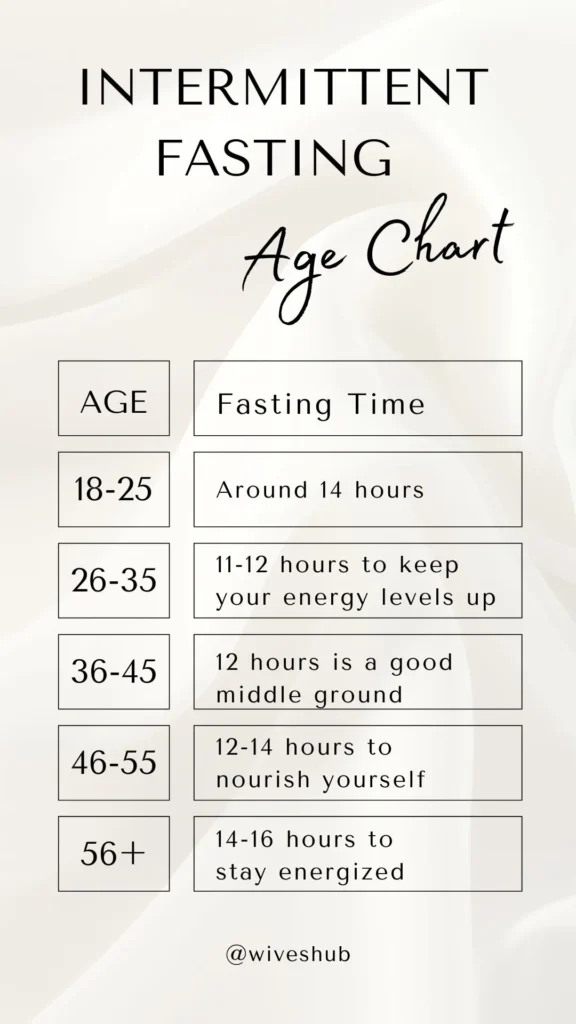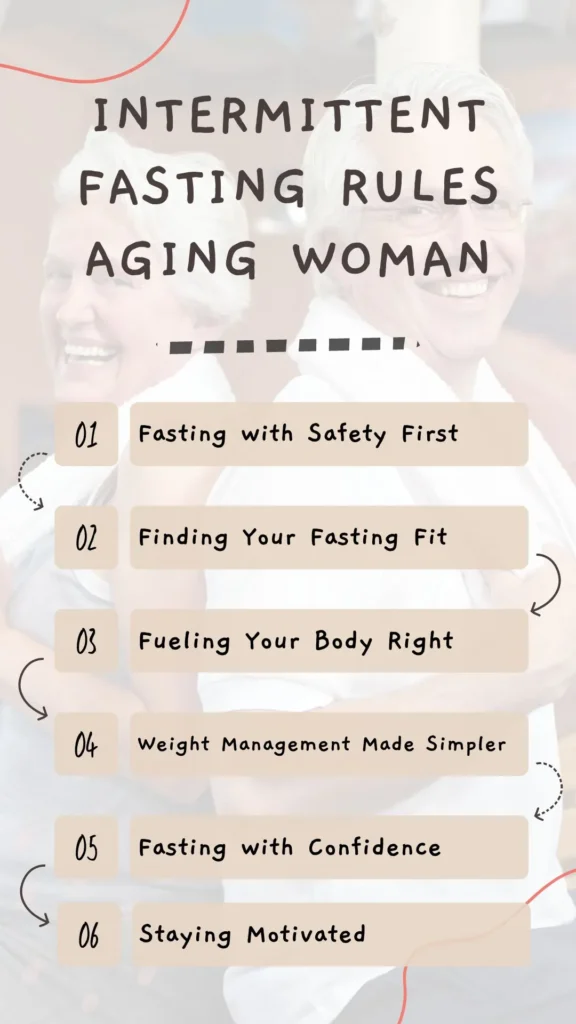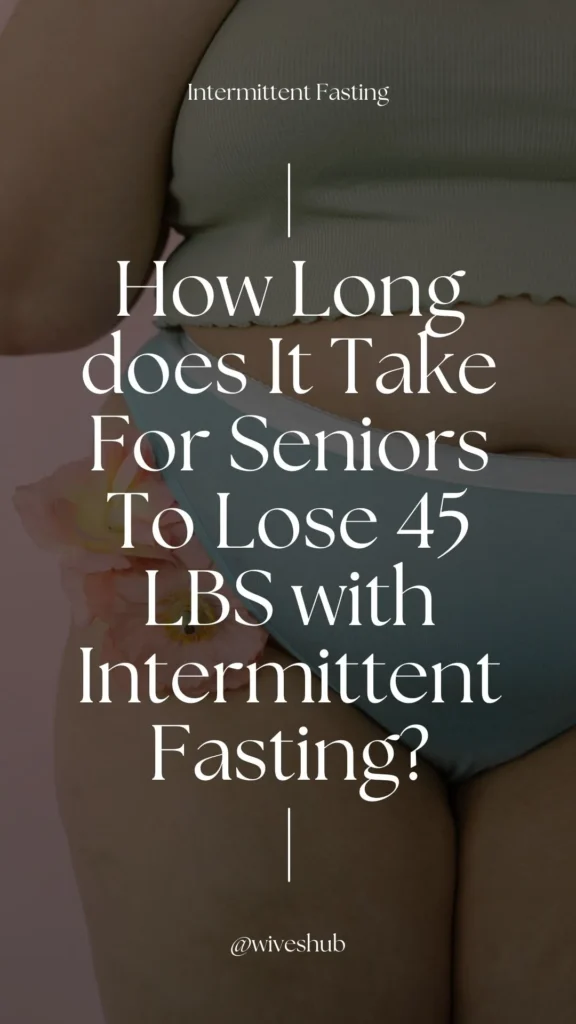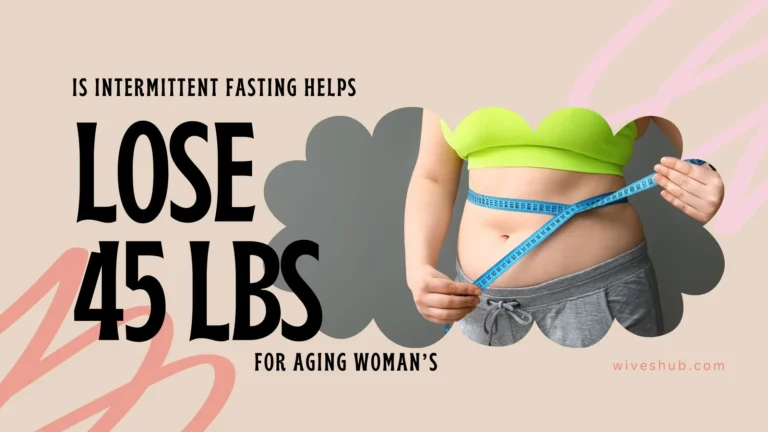Thinking about trying fasting as you get older? It might actually be good for you! This article talks about the cool ways fasting could help you stay healthy and energized.
There are different fasting plans out there, like intermittent fasting or just eating within certain times. Women especially might need to think about what nutrients they need and how their bodies change as they age when they try fasting.
Fasting can even work with your religious beliefs if you’re interested! The most important thing is to do it safely. Stay hydrated, make sure you’re getting the vitamins and stuff you need, and talk to your doctor before you start. This way, fasting can become a way to keep you feeling great as you get older!
Intermittent Fasting by Age Chart
There’s no magic fasting plan for every age, but this might give you a general idea of where to start. Remember, this ain’t a one-size-fits-all deal, so listen to your body and talk to your doc before diving in.
| Age | Fasting Time (like a snooze) | Eating Time (nom nom!) | Things to Keep in Mind |
| 18-25 | Around 14 hours | 10 hours to fuel your awesome self | You might have more wiggle room, but listen to your body and make sure you’re getting enough nutrients. |
| 26-35 | 12-13 hours | 11-12 hours to keep your energy levels up | Your metabolism might be starting to slow down a bit, so be kind to yourself and don’t push the fasting too hard. |
| 36-45 | 12 hours is a good middle ground | 12 hours for a balanced approach | Try a simple 12:12 plan (fasting for 12 hours, eating in a 12-hour window). |
| 46-55 | Quicker fasts | 12-14 hours to nourish yourself | Things might be changing hormone-wise, so focus on packing your eating window with nutritious foods. |
| 56+ | Shorter fasts, around 8 hours | 14-16 hours to stay energized | Shorter fasts might be better for you now. Make sure you’re getting enough protein and all the good stuff your body needs. |

Alright, so how does intermittent fasting play out at different ages? Here’s the skinny:
1. Young adults
Young adults (20s-30s) can potentially benefit from intermittent fasting in a few ways:
- Keeping a healthy weight: Fasting may help young adults stay at a healthy weight or lose weight if needed.
- Better metabolism: Intermittent fasting might improve how your body uses energy.
- Lower risk of chronic diseases: This way of eating could reduce the risk of health problems like diabetes and heart disease later in life.
3. Middle-aged Adults
Here’s what intermittent fasting can offer for middle-aged adults (40s-50s) in a way that’s easy to understand:
- Manage your weight: Fasting can be a tool to stay at a healthy weight or shed some pounds if you want to.
- Fight fatigue: Say goodbye to afternoon slumps! Fasting might help you have more energy throughout the day.
- Sharper mind: Intermittent fasting could even give your brain a boost, keeping you thinking clearly.
4. Seniors
Here’s a breakdown of intermittent fasting for seniors (60+) in a simpler way:
- Stay at a healthy weight: Fasting can help you maintain a healthy weight or lose some pounds if needed, which can be especially helpful as your metabolism changes with age.
- Happy heart: Fasting might improve your heart health, which is important for overall well-being.
- Sharper mind: Intermittent fasting could even help your brain function better, keeping your memory sharp.
Important thing to remember: Fasting plans aren’t one-size-fits-all. Talk to your doctor about the best approach for your health and how to tailor it to your needs.
wiveshub.com
Is Intermittent Fasting Safe for the Aging Woman?
Alright, thinking about fasting as you get older? It can be a great way to stay healthy, but there are a few things to keep in mind, especially for women.
- Lent Rule For Intermittent Fasting
Fasting for Lent? It can be a great way for seniors to combine faith and healthy habits! Just remember to talk to your doctor first to make sure it fits your needs. This combo of tradition and healthy choices can be a real win-win for your well-being!

Intermittent fasting (IF) might be the key you’ve been searching for! Here’s a simplified guide to get you started:
1. Fasting with Safety First
- Hydration Hero: Water is your best friend! Stay hydrated throughout the day, especially during fasting windows.
- Listen to Your Body: Feeling sluggish? Don’t push it! Adjust your fasting plan as needed for optimal energy.
- Go Easy on Exercise: During fasting periods, opt for gentle movement instead of intense workouts.
2. Finding Your Fasting Fit
- Flexible Feasts: Choose a fasting window that works for YOU. Seniors may benefit from slightly longer eating windows to ensure proper digestion and nutrient intake.
3. Fueling Your Body Right
- Feast on the Best: Focus on a nutrient-rich diet packed with fiber and essential vitamins and minerals.
- Hydration Matters: As we age, staying hydrated becomes even more important. Make water your go-to drink!
4. Weight Management Made Simpler
- Slow and Steady Wins the Race: Forget crash diets! Intermittent fasting promotes sustainable weight loss for a healthier you.
- Balanced Bites: Fill your plate with a rainbow of fruits and vegetables, lean proteins, and whole grains to keep your body happy.
5. Fasting with Confidence
- Doctor Knows Best: Always consult your doctor before starting any new health regimen, especially if you have pre-existing health conditions. They’ll help you personalize a safe and effective fasting plan.
- Listen, Learn, and Adapt: Be open to guidance from your doctor, and remember, prioritizing your health is key!
6. Staying Motivated
- Set SMART Goals: Set realistic and achievable goals to keep yourself motivated and on track. Great things take time!
- Routine is King: Create a consistent fasting schedule and meal plan to make IF a seamless part of your daily routine.
Intermittent fasting can be a fantastic tool to enhance your well-being. By following these simple steps, you can embark on a healthy and empowering journey towards a more vibrant you!
How Long does It Take For Seniors To Lose 45 LBS with Intermittent Fasting?

It’s difficult to give a specific timeframe for weight loss with intermittent fasting, especially for seniors. But remember, intermittent fasting is a journey, not a race. By prioritizing your health and making sustainable changes, you’ll be on the path to a healthier and happier you!
